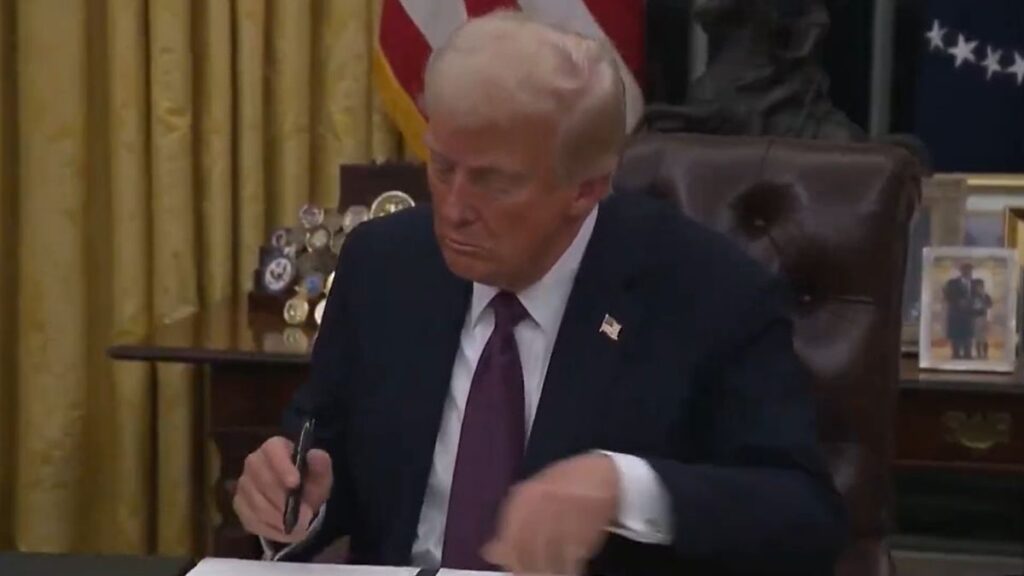In recent weeks, President-elect Donald Trump has stirred controversy with his public remarks about the Panama Canal. Specifically, he has proposed that the canal should be returned to the United States, threatening military action if necessary. His statements have raised questions about both the feasibility and the broader consequences of such a drastic move. This explainer will break down the historical context, the potential implications of Trump’s threat, and the challenges of any military intervention in Panama.
Read More: Shaking the Foundations of Justice: Trump’s Pardons of January 6 Criminals
The Panama Canal: A Legacy of American Influence
The Panama Canal has long been a symbol of American geopolitical power. Built by the United States in the early 20th century, it was initially under U.S. control until the Panama Canal treaties of 1978.
- The Carter-Torrijos Treaty (1977): Signed by U.S. President Jimmy Carter and Panamanian leader Omar Torrijos, the treaty paved the way for the eventual transfer of the canal to Panama.
- The Canal’s Return (1999): The canal was fully handed over to Panama on December 31, 1999, after the successful implementation of the treaty. The transition was peaceful and marked the end of more than 80 years of U.S. governance over the canal zone.
- U.S. Interests Today: Despite the change in control, over two-thirds of the traffic passing through the canal is still bound for U.S. ports, making it a critical asset for global trade and U.S. economic interests.
Trump’s Assertion: Military Action or Diplomatic Bluff?
During his presidential campaign and after his election, Donald Trump has repeatedly claimed that Panama should return the canal to the United States, even suggesting the use of military force. These bold statements have raised eyebrows, as they challenge decades of U.S. foreign policy and historical agreements.
- Public Statements: Trump has stated that the U.S. could reclaim the canal through military force, which would overturn the agreements made by past presidents.
- Panama’s Response: Panama’s President, José Raúl Mulino, firmly rejected Trump’s comments, emphasizing that the canal belongs to Panama and would remain so.
Why Reclaiming the Canal Would Be a Complicated and Costly Endeavor
Any attempt by the U.S. to seize the Panama Canal, whether through military means or diplomatic pressure, would come with significant obstacles:

1. Military Intervention: A Major Undertaking
A military operation to retake the canal would be logistically and politically challenging:
- Size of the Operation: The Panama Canal Zone covers over 500 square miles. Given Panama’s population of 4.5 million people, the U.S. would need a large force to maintain control.
- Military Estimates: U.S. Army figures suggest at least 90,000 U.S. troops would be required to engage in counterinsurgency operations, a costly and resource-intensive undertaking.
- Geopolitical Consequences: Any military action would likely be met with global condemnation and disrupt the stability of the region. Latin American nations, in particular, would oppose such aggression.
Read More: The World Watches as Trump Takes Office Again—Tensions, Trade, and the Future of Global Politics
2. Legal and Constitutional Barriers
For a military action to occur, the U.S. president would typically need authorization from Congress. Current legal frameworks, such as the post-9/11 Authorization for Use of Military Force (AUMF), are intended to address threats posed by terrorism groups, not territorial disputes.
- Lack of Justification: No current global or legal precedent justifies military action to seize a sovereign nation’s territory, particularly after an international agreement like the Panama Canal treaties.
- International Law: Any use of force would violate international law governing the sovereignty of nations.
3. Disruption to Global Trade
The Panama Canal is a vital artery for international trade, with approximately 6% of global shipping passing through it annually. A military conflict would severely disrupt this flow:
- Economic Impact: The U.S. economy, heavily reliant on the canal for shipping goods, would suffer along with the global market.
- Regional Instability: Disruptions in Panama could ripple across Latin America and the broader international trade network, potentially impacting U.S. allies.
The Political and Public Backlash
Beyond the military and legal considerations, any move to reclaim the canal would face significant political and public opposition.
- Public Opinion: Many Americans might not support a new military conflict, especially after years of military entanglements in the Middle East. Trump himself has criticized prolonged U.S. military involvements, making it difficult to justify a new intervention in Panama.
- Political Resistance: Both Democratic and Republican leaders who supported the Panama Canal treaties would likely resist any attempt to undo the historic agreements.
A Risky and Unlikely Proposal

While Trump’s comments about the Panama Canal reflect his tendency to challenge established norms, the idea of reclaiming the canal through military force is fraught with challenges. The U.S. would face significant political, legal, military, and economic hurdles. Additionally, the international community would likely reject such aggressive actions, further isolating the United States.
- Key Takeaways:
- The Panama Canal’s transfer to Panama was a landmark achievement in international diplomacy, upheld by successive U.S. administrations.
- Trump’s call for military action would face substantial obstacles, including legal barriers, military complexity, and global condemnation.
- A military conflict over the canal would disrupt global trade and strain U.S. relations with Latin America and beyond.
Read More: TikTok’s Temporary Block Lifted: How Trump’s Actions Are Shaping the App’s U.S. Destiny







